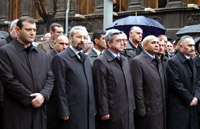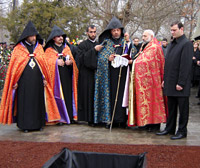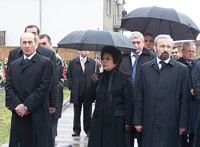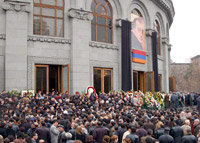It’s hard to remember when our nation has last time gathered like that as did during the funeral of Armenia’s prime minister, Andranik Margaryan. Despite the pouring rain the Liberty Square of Yerevan was full of people waiting with umbrella to go inside the Opera House to pay their farewell to Margaryan. However not everybody was able to go in because of shortage of time.
Margaryan, who died Sunday of a heart attack aged 55, was buried in the national Komitas Pantheon after a lengthy funeral service that began from his Yerevan apartment at 10:30a.m. Hundreds of cars and buses slowly moved behind his coffin, placed on an artillery caisson and surrounded by honor guard, towards the city center. The procession briefly stopped outside the headquarters of Margaryan’s Republican Party (RPA) and the nearby main government building before the body was taken to Yerevan’s State Opera House where it lay in state for three hours. Big crowds that gathered outside the building then filed past the open coffin as President Robert Kocharyan and top government officials and prominent politicians took turns to stand guard over it. The ceremony was broadcast live by state television. Margaryan’s body was carried through the city center to the Pantheon after a prayer service led by Catholicos Garegin II, head of the Armenian Apostolic Church.
 In an eulogy read out at the burial site, parliament speaker Tigran Torosyan, who is also a senior member of the RPA, paid tribute to his longtime associate. “For our state and our people, the loss of is immense and sorrow infinitely deep,” Torosian said. “But today … we can also see that there is a lot we can draw comfort from.” “Andranik Margaryan will be remembered as a remarkable statesman who distinguished himself with a unique style and pronounced personality,” he added. Opposition politicians attending the ceremony also heaped praise on the deceased premier, saying that he tolerated dissent and always sought dialogue with his political opponents. “In my view, the most important trait of Andranik Margaryan was his kindness,” said Artur Baghdasaryan, the former parliament speaker whose Legal State Party was part of the RPA-led governing coalition until last year. Another well-known opposition parliamentarian, Arshak Sadoyan, described Margaryan as a “bridge between the government and the opposition.” The funeral service was also attended by foreign dignitaries representing over a dozen states and international organizations. “Armenia has lost its great son, and I have lost a friend,” one of them, Georgian Prime Minister Zurab Noghaideli, told reporters. “He felt bad for Armenia’s isolation and was confident that Armenia will be a free and democratic country,” said Russian Transport Minister Igor Levitin.
In an eulogy read out at the burial site, parliament speaker Tigran Torosyan, who is also a senior member of the RPA, paid tribute to his longtime associate. “For our state and our people, the loss of is immense and sorrow infinitely deep,” Torosian said. “But today … we can also see that there is a lot we can draw comfort from.” “Andranik Margaryan will be remembered as a remarkable statesman who distinguished himself with a unique style and pronounced personality,” he added. Opposition politicians attending the ceremony also heaped praise on the deceased premier, saying that he tolerated dissent and always sought dialogue with his political opponents. “In my view, the most important trait of Andranik Margaryan was his kindness,” said Artur Baghdasaryan, the former parliament speaker whose Legal State Party was part of the RPA-led governing coalition until last year. Another well-known opposition parliamentarian, Arshak Sadoyan, described Margaryan as a “bridge between the government and the opposition.” The funeral service was also attended by foreign dignitaries representing over a dozen states and international organizations. “Armenia has lost its great son, and I have lost a friend,” one of them, Georgian Prime Minister Zurab Noghaideli, told reporters. “He felt bad for Armenia’s isolation and was confident that Armenia will be a free and democratic country,” said Russian Transport Minister Igor Levitin.
 The U.S. government was represented by Deputy Assistant Secretary of State Matthew Bryza. “Prime Minister Margaryan was a very good and constructive partner,” he said. “I had the honor to know him personally.” Bryza refused to comment on political implications of the Armenian premier’s death. “It’s really difficult to make predictions, and I won’t do that because today is a very sad day,” he explained. March 28 was an official day of mourning in Armenia, with flags on government buildings and Armenian diplomatic missions abroad flying at half-mast and television channels broadcasting mainly somber music.
The U.S. government was represented by Deputy Assistant Secretary of State Matthew Bryza. “Prime Minister Margaryan was a very good and constructive partner,” he said. “I had the honor to know him personally.” Bryza refused to comment on political implications of the Armenian premier’s death. “It’s really difficult to make predictions, and I won’t do that because today is a very sad day,” he explained. March 28 was an official day of mourning in Armenia, with flags on government buildings and Armenian diplomatic missions abroad flying at half-mast and television channels broadcasting mainly somber music.
Leader of the Prosperous Armenia party (Margaryan’s party’s rival), Gagik Tsarukyan said Armenia “lost its favored leader, good friend and great patriot,” and said the late PM was “a national figure to the marrow”. From Nagorno Karabakh, President Arkady Ghukhasyan praised Margaryan for his role in establishing independent Karabakh. “The veritable patriot’s memory will remain vivid in the memory of all of us,” Ghukhasyan said, “in the memory of all Armenian people.”Heritage Party founder Raffi K. Hovannisian, whose party has often crossed swords with Margaryan’s government, called the prime minister a “deserving son of the Armenian people”. In a statement, former Minister of Foreign Affairs Hovannisian wished “peace and light to Andranik Margaryan – a prominent party and political leader, a great follower of (national ideologist Garegin) Nzhdeh’s unfading ideas. His name will never be forgotten.” While the nation mourns and memorializes its 10th prime minister, Margaryan’s seat remains empty, as the president has, by constitutional order, 10 days to appoint a successor.
The death of the leader of the Republican Party, Prime Minister Andranik Margaryan will have an inevitable effect on the government and will cause changes in the ongoing processes. However, this is a matter of future, and even the replacements which will inevitably take place soon in relation to the vacant post of prime minister not only are not the start of these changes but also do not even mark the direction of the expected change. The point is that though the arrangements inside the government are shown to be kept, in reality soon the necessity for new arrangements will occur, because not the place of a separate figure or a separate group became vacant but that of an entire government pole. Consequently, it needs to be filled in or shared by all the others.
 Ostensibly, the arrangement made during the meeting of Robert Kocharyan with the majority parties after the death of the prime minister is provisional. At least, maintaining the status quo until the election is in the interests of all the government forces. Each of them would certainly with to change it to favor them, making use of certain gaps that have occurred, but it requires proactive steps which will set the rest of the government against the one who will make this move. It means that presently any government pole needs to have guarantee of support from the adjacent circles, the sides of the pyramid, to try to change the status quo. However, time is too short for this, and efforts to go ahead of time may cause general instability, which will make the situation unpredictable and will make new arrangements impossible. Meanwhile, the old ones will have become obsolete. The arrangement made at the residence of the president is perhaps that nobody takes action. In other words, everything remains the same as before the death of the prime minister. It is clear, however, that the fact of non-existence of Margaryan underlies everyone’s actions, and in pursuing their plans nobody can overlook the death of the prime minister. In other words, this truce appears to be artificial.
Ostensibly, the arrangement made during the meeting of Robert Kocharyan with the majority parties after the death of the prime minister is provisional. At least, maintaining the status quo until the election is in the interests of all the government forces. Each of them would certainly with to change it to favor them, making use of certain gaps that have occurred, but it requires proactive steps which will set the rest of the government against the one who will make this move. It means that presently any government pole needs to have guarantee of support from the adjacent circles, the sides of the pyramid, to try to change the status quo. However, time is too short for this, and efforts to go ahead of time may cause general instability, which will make the situation unpredictable and will make new arrangements impossible. Meanwhile, the old ones will have become obsolete. The arrangement made at the residence of the president is perhaps that nobody takes action. In other words, everything remains the same as before the death of the prime minister. It is clear, however, that the fact of non-existence of Margaryan underlies everyone’s actions, and in pursuing their plans nobody can overlook the death of the prime minister. In other words, this truce appears to be artificial.

